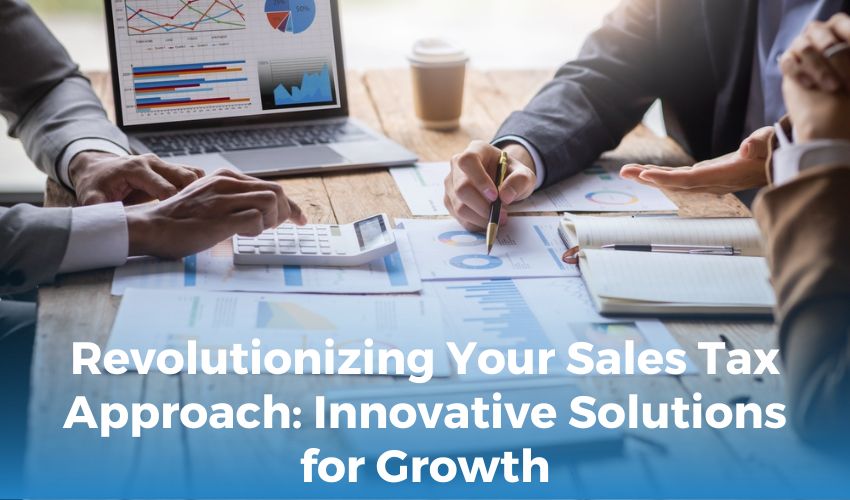

20-12-23
In the dynamic landscape of business, the ever-evolving realm of sales tax can pose a significant challenge for enterprises aiming for sustained growth. As governments adapt their tax regulations and consumers become more discerning, it's imperative for businesses to revolutionize their sales tax approach. In this article, we'll explore innovative solutions that not only ensure compliance but also contribute to overall business growth.
1. Embrace Automation for Accuracy and Efficiency
The manual calculation and tracking of sales tax can be error-prone and time-consuming. By embracing automation, businesses can enhance accuracy and efficiency in their sales tax processes. Automated systems can seamlessly integrate with your existing financial software, reducing the likelihood of human errors and streamlining the entire tax calculation and reporting workflow. This not only ensures compliance but also frees up valuable resources that can be redirected towards strategic business initiatives.
2. Implement Real-Time Transaction Monitoring
In the era of instant transactions, real-time monitoring of sales activities is essential. Implementing systems that provide live insights into transactions allows businesses to stay proactive in their approach to sales tax compliance. Real-time monitoring not only helps in identifying potential issues promptly but also facilitates quick decision-making. This agility is crucial in adapting to changing tax regulations and market dynamics.
3. Leverage Cloud-Based Solutions for Accessibility
Traditional methods of managing sales tax data often involve complex spreadsheets and on-premise software, limiting accessibility and collaboration. Cloud-based solutions offer a more flexible and accessible approach. With data stored securely in the cloud, businesses can access information from anywhere, facilitating collaboration among teams working in different locations. This accessibility ensures that everyone involved in the sales tax process is on the same page, promoting a more cohesive and efficient workflow.
4. Utilize Data Analytics for Strategic Insights
Data analytics is a powerful tool that goes beyond mere compliance. By leveraging advanced analytics, businesses can gain valuable insights into consumer behavior, market trends, and the impact of sales tax on purchasing decisions. Analyzing this data empowers businesses to make informed strategic decisions, optimize pricing strategies, and identify new opportunities for growth. In essence, data analytics transforms sales tax compliance from a regulatory obligation into a strategic asset.
5. Explore Tax Planning and Optimization Strategies
Innovative businesses don't view sales tax merely as a cost but as an area ripe for optimization. Exploring tax planning strategies can lead to significant savings. This includes understanding tax exemptions, credits, and incentives that may be available in different jurisdictions. By staying informed about tax laws and strategically planning sales tax activities, businesses can minimize tax liabilities and redirect those savings toward initiatives that foster growth.
6. Foster Cross-Functional Collaboration
Sales tax compliance is not just a finance or accounting concern; it involves various departments within a business. Cross-functional collaboration is crucial for a holistic and effective approach. Sales teams, IT, legal, and finance departments should work collaboratively to ensure that the entire organization is aligned with sales tax compliance goals. This collaboration helps in identifying potential issues at an early stage and ensures that all aspects of the business are considered in the sales tax strategy.
7. Stay Informed About Regulatory Changes
The only constant in the world of sales tax is change. Governments frequently update tax regulations, and staying informed about these changes is essential for compliance. Subscribing to newsletters, attending webinars, and actively participating in industry forums are effective ways to stay ahead of regulatory changes. By proactively adapting to new requirements, businesses can avoid penalties, reduce compliance risks, and maintain a positive relationship with tax authorities.
Conclusion
Revolutionizing your sales tax approach requires a proactive and innovative mindset. By embracing automation, implementing real-time monitoring, leveraging cloud-based solutions, utilizing data analytics, exploring tax planning strategies, fostering collaboration, and staying informed about regulatory changes, businesses can transform sales tax. The integration of these innovative solutions not only ensures compliance but also positions businesses for sustained growth in an ever-changing business environment.
Tags : sales tax registration,sales tax calculation













































.jpg)
.jpg)
.jpg)
.jpg)


).jpg)














 Get A Quote
Get A Quote
Leave A Comment